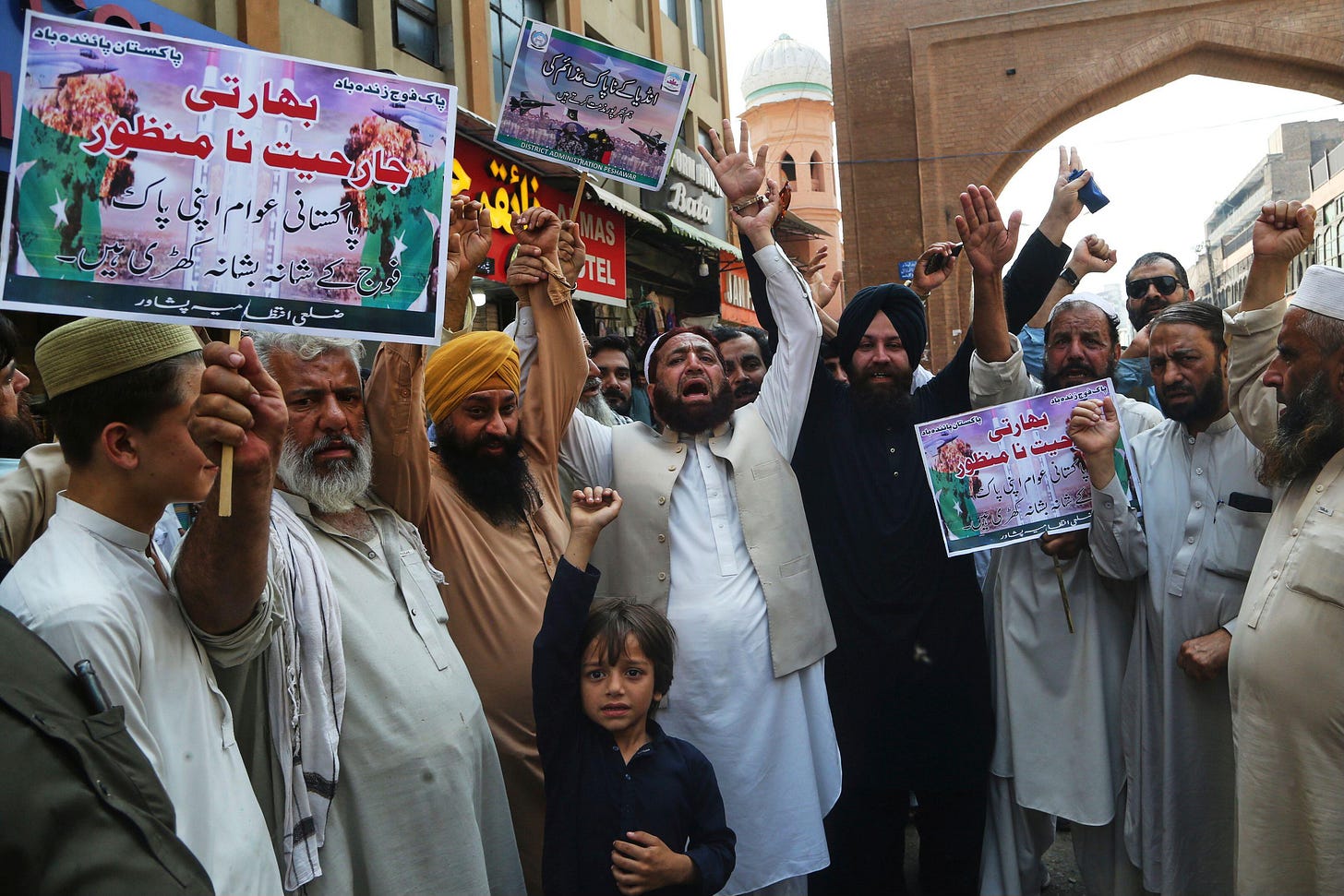“This heinous act of aggression will not go unpunished,” Pakistani leader Shehbaz Sharif warned India today, as the nuclear-armed rivals inch closer to all-out war following a spate of deadly Indian airstrikes on Pakistan this morning.
India’s foreign ministry, meanwhile, insists: “The whole country is happy we took revenge”.
In the early hours of today, India launched a series of missile strikes on nine sites in Pakistan and Pakistan-administered Kashmir, which Islamabad says killed at least 26 people, including a child, and injured 46 more.
Delhi claims the strikes targeted camps and hideouts affiliated with Pakistan-based militants Lashkar-e-Taiba and Jaish-e-Mohammed, which it holds response for an attack in Kashmir last month - the deadliest on civilians in the region in over two decades - that has triggered a sharp escalation in tensions with its long-time rival, Pakistan.
On 22 April, 26 people, mainly Indian tourists, were killed in Pahalgam, in Indian-administered Jammu & Kashmir, after five gunmen emerged from the pine forests and launched their ambush.
A manhunt for the killers is still underway. But the Indian government says it has evidence linking Pakistan-based militants to the attack. Islamabad denies this, challenging it to produce any evidence to support its accusation.
This morning’s targeting of Bahawalpur town in Pakistan’s most populous Punjab province is the deepest Delhi has struck since the two countries’ war in 1971. According to the Indian government, the attack in Bahawalpur was targeting Masood Azhar, the head of Jaish-e-Mohammed.
Pakistan’s military says it shot down five of the Indian jets, two of which came down in Kashmir and one in India’s Bathinda. India is yet to comment.
There are also reports emerging today of cross-border shelling along the militarised “line of control” that separates the Indian and Pakistani areas of the disputed Kashmir territory. The Indian army says at least 10 civilians have been killed by Pakistani shelling on its side of the border.
What now?
Neither side wants all-out war, but they both want to demonstrate strength to their domestic population.
India has done so by taking decisive action to avenge last month’s attack. Meanwhile, Pakistan’s claim that it has downed several Indian aircraft is one way for it to avoid looking weak. Meaning this development could create room for de-escalation.
But it may not be enough. We should prepare for the possibility of a retaliatory attack on Indian soil.
Pakistan’s Security Committee has been clear that it reserves the right to respond to India’s strikes "at a time, place and manner of its choosing".
Indo-Pakistani relations have, without a doubt, plummeted to their lowest point in decades. The biggest deterrent for both sides? As ever, the other nuclear’s arsenal.
Caitlin Allen
Deputy Editor
ON REACTION TODAY
Adam Boulton
Labour’s inflexibility has backfired
Anthony Peters
Victory Day’s varied interpretations
ALSO KNOW
Conclave begins - Cardinals are at the Vatican today, meeting behind closed doors to elect a successor to Pope Francis. The doors to the Sistine Chapel are locked with the first vote expected to be taken this afternoon.
US and China to hold talks in Geneva - The US and China are expected to hold ice-breaker talks in Switzerland on Saturday, as possibly the first step in resolving their ongoing trade war. Tariff reductions, duties on specific products and export controls are all expected to be discussed.
Venezuelan dissidents escape - Five aides to the Venezuelan opposition leader’s María Corina Machado, who had been under siege in the Argentine ambassador’s residence in Caracas for 15 months, have made it to US soil after what Washington described as a “successful rescue” mission. Machado herself has been in hiding inside Venezuela since leading a campaign to oust President Maduro in elections last year.
Orsted to halt offshore wind project - Orsted, the world’s largest offshore wind farm development, has discontinued the North Sea Hornsea 4 project only a year after securing government support. The wind farm was expected to be capable of powering 2.6 million homes. Orsted stated that the project is no longer financially viable, thanks to increasing supply chain costs, rising interest rates and potential delays.
FIVE THINGS
The US President’s daily dose of intelligence. David Priess in Engelsberg Ideas.
Tories slump to 17 per cent in poll, reports The Spectator’s James Heale.
We are still fighting the Second World War. Antony Beevor in Foreign Affairs on the unsettled legacy of the conflict that shaped today’s politics.
How Russia and Ukraine are playing Trump’s blame game. Joshua Yaffa in The New Yorker.
Buy the dip: the trend that keeps stocks from crashing, in The Economist.





